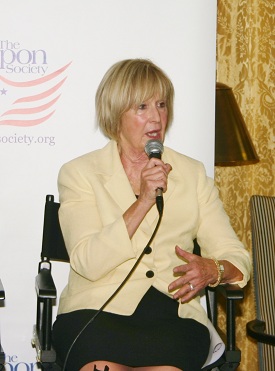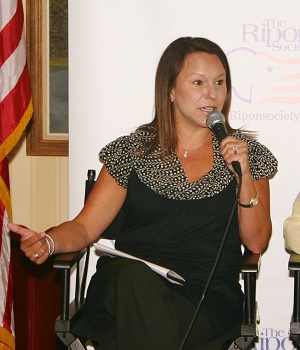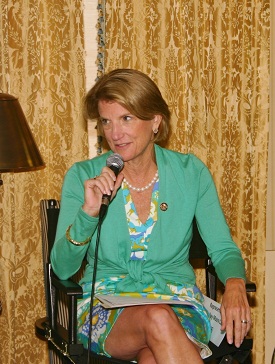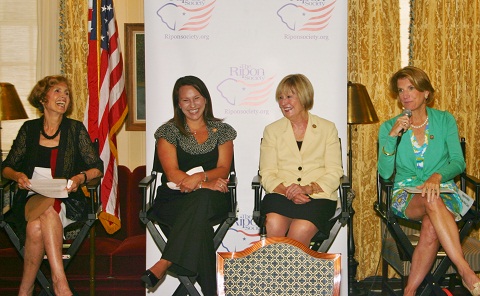Roby, Biggert & Capito Discuss Budget, Bipartisanship, and Other Key Issues at Ripon Society Breakfast

WASHINGTON, DC – The Ripon Society hosted a breakfast discussion this past Thursday morning with three Republican women serving in the U.S. House of Representatives, who not only discussed budget reform, bipartisanship, and other key issues being debated on Capitol Hill, but shared their thoughts on why they would like to see more women serving alongside them in Congress, as well.
The discussion was moderated by The Honorable Connie Morella, who represented Maryland’s 8th District in Congress from 1987 to 2003, and later served as Ambassador to the Organization for Economic Cooperation and Development from 2003 to 2007. Participating in the discussion were Representatives Shelley Moore Capito (WV-2), Judy Biggert (IL-13), and Martha Roby (AL-2), who began her remarks by expressing her belief that the focus on women’s issues is sometimes too narrow and by recounting an exchange she had on the topic with the House Majority Leader earlier this year.
“I had a conversation with Eric Cantor not too long ago during the VAWA [Violence Against Women Act] debate,” the Alabama Republican stated. “And I said: ‘Eric, I’ve just really got to get this off my chest. We have to be very careful here. We don’t have women’s issues. The same issues that are important to you — I promise you — are important to me. I go to the grocery store. I fill my car up with gas. These things are important to me as well.’ Sometimes, we understand those issues better. I think it is so important that we need women in Congress. We need more women in Congress, because we offer a perspective that is vitally important to the American people and our economy.
“Part of that is sitting around the kitchen table and looking at your finances and figuring out what you make, and then how much can you spend, and how much do you want to save. What I quickly learned once I came here is that Washington does not work that way. I served on a nine-member city council for almost two terms, and we did it by law! We had to balance our budget. We couldn’t spend more than we brought in. And if we did, we were in big trouble.”

To help address this problem on the federal level, Roby said she has introduced The Honest Budget Act, a reform bill that would eliminate many of the gimmicks that have been part of the budget process.
Among other things, the legislation would: make it more difficult to pass appropriation bills without first approving a budget; tighten rules about using ‘emergency designations’ and ‘disaster designations’ to justify off-budget spending; reveal both the real cost and the real commitment on what the federal government is spending; and, prevent Congress from relying on phony rescissions, or claiming savings, unless the savings are real and genuine.
“If we don’t spend money that has been authorized, then we turn around and use it as an offset for deficit spending,” Roby remarked, referring to one current particularly egregious practice in federal budgeting. “Outside of the major mandatory spending issues that we have, that’s how we’ve gotten into this mess over the course of years. What this bill attempts to do is alleviate the ability to use that kind of gimmickry to the American people. It’s truth – honesty – in saying, ‘This is what we have. This is what we can spend. And this is how we save.’ I think the American people are really crying out for that.”
In her remarks following Congresswoman Roby, Congresswoman Biggert discussed something else that, she said, the American people are crying out for – bipartisanship.
“I think the American people are really concerned about job creation, economic growth, and debt. But the third thing I hear from people at home is, ‘Why can’t you get together and solve this problem?’” To that end, Biggert pointed to recently enacted legislation to reauthorize the National Flood Insurance Program as an example of a bill on which Republicans and Democrats did come together for the common good.
Biggert authored the legislation and chairs the Financial Services Subcommittee on Insurance, Housing and Community Opportunity, which has oversight over NFIP. According to Biggert, the legislation – which would reauthorize NFIP for five years and modernize a program that was operating with a $17 billion deficit – was not only the byproduct of extensive negotiations between the two parties, but the result of her collaboration with Democratic Representative Maxine Waters (CA-35), who serves on the Subcommittee.
“I just think it takes a lot of working together,” Biggert observed. “Maybe that is what we really need to look at. Politics is the art of the possible. It is also the compromise that really is needed. A couple of years ago, I started the Financial Literacy Caucus. I did that because I thought some of our Members needed Economics 101 — even on the Financial Services Committee! So I started that caucus. I think we need another caucus called ‘Negotiations,’ because I think we really have to work out, sit down and do that if we’re really to find all the answers. It’s a real challenge. But negotiations are so important in working across the aisle.”

Congresswoman Capito echoed her colleague’s remarks.
“I think Judy is right,” the West Virginia Representative stated. “The tone sets a lot of how we’re able to work together … Young people just aren’t paying attention anymore. They’re not going to watch us bicker and stab a knife and denigrate. It’s just unappealing to them to want to get into the political process if this is the way it moves forward.”
Returning to the topic of women’s issues, Capito pointed to her work as Chairwoman of the Financial Services Subcommittee on Financial Institutions and Consumer Credit as an area where Congress can – and must – make a difference in this regard.
“I think there’s nothing more critical to a woman or family than financial services,” the Chairwoman stated. “Access to credit, being able to afford not just food, but an education for your child, a new car, in my case, health care for elderly parents, all of the stresses and strains – a lot of that falls on the woman.” Citing a recent study which revealed an increasing number of children are being raised in households without two parents, Capito continued: “The family structure in this country is changing. Higher percentages of children are being born into single-parent families. Obviously, that is a woman — the woman who is head of the household without support – and there are all sorts of issues surrounding that. But economically, that presents enormous challenges to this next generation of families.”
Another challenge many women currently face has to do with credit, Capito noted. This challenge stems from a regulation contained in the Credit CARD Act of 2009 that can deny credit to a woman who stays at home if she does not have her own source of income.
“I stayed at home with my children for 16 years and earned nothing,” Capito stated, recalling her own experience as a stay-at-home Mom. “During the 16 years I was staying home with them, I had a lot of fun and earned a lot of great relationships with them and all things that you can’t put a price tag on. I loved it. But if I were to have applied for a credit card during that period of time, I would not have been able to get a credit card in my own name because I would have had no ability to repay.

“This is happening across the country now because of this new regulation. Let’s put it into perspective. You’re in a military family, your husband’s deployed, you can’t get a credit card while you’re home taking care of the kids. Or you’re in an abusive relationship. The first thing that a counselor is probably going to tell you is, ‘You’ve got to start establishing credit in your own name if you think you’re going to get out of a marriage, whether it’s abusive or you want to separate or whatever.’ It is very difficult to gain the self-esteem and the economic means to be able to get out of a difficult situation if you don’t earn any money.
“So we’re trying to fix this. We’re pressing the CFPB [Consumer Financial Protection Bureau] to redo the rule, to look at the household income, to have some other way of looking at it so that the establishment of credit in your own name is available.”
The Ripon Society is a public policy organization that was founded in 1962 and takes its name from the town where the Republican Party was born in 1854 – Ripon, Wisconsin. One of the main goals of The Ripon Society is to promote the ideas and principles that have made America great and contributed to the GOP’s success. These ideas include keeping our nation secure, keeping taxes low and having a federal government that is smaller, smarter and more accountable to the people.



